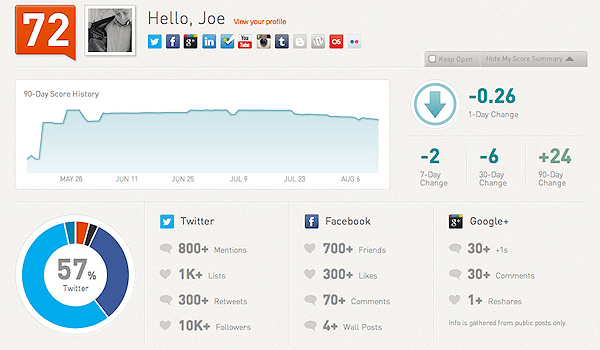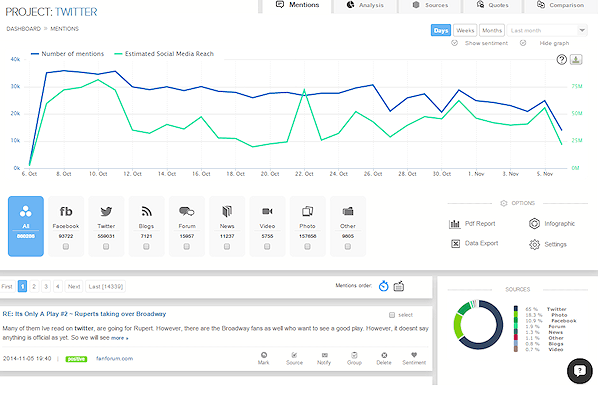How to successfully monitor your brand on the Internet?
I’m reinventing the wheel and summarizing why it’s good to keep track of mentions of your brand on the Internet. Then I’m suggesting how to do it and select tools suitable to the needs and budget.
Why it’s worth monitoring your brand
Is your brand talked about? Then it’s good. But do they talk about it well? If you don’t know then it’s not good.

Photo by: Craig Sunter
Your brand is on the Internet, whether you want it or not. And what will be written about it will stay there forever.
If you have your head screwed on you actively use the Internet in your marketing and PR. And you include the social media because you know it well that even Google takes social signals into account when assessing websites and building its rankings.
That’s why you find it important to:
- measure the effectiveness of your actions,
- know what’s the image of your brand on the Internet,
- keep in regular contact with your clients,
- be able to quickly respond to emergency situations.
You can use the Internet monitoring for other purposes, for example to:
- keep track of other brands (competition),
- spot potential enquiries,
- observe market trends.
Is your brand talked about? Then it’s good. But do they talk about it well? If you don’t know then it’s not good. siteimpulse.com/blogen/…
Built-in notifications
Every social platform has a built-in functionality of email notifications. They’re sent in various situations, which often becomes irritating enough for users to switch them off. Make sure you don’t have the most important notifications switched off, i.e. the ones that inform you about any comments under your posts, about mentions on Twitter etc.
Google Alerts (free)
Google launched Alerts in 2003. The service, however – though it’s free – is not especially popular. On the one hand Google doesn’t promote it at all. On the other hand the way it functions leaves much to be desired. But if your budget for the Internet monitoring is basically zero try Google Alerts.
The service is very simple – you can define any number of keywords and set a few simple options for each of them. The most important of options is selecting what is to be searched. You choose from: News, Blogs, Websites, Videos, Books and Discussion groups.
Depending on the configuration you will receive alerts immediately, once every 24 hours or once a week. I of course recommend real time notifications. After all, there’s so much that can happen within 24 hours!
IFTTT (free)
IFTTT is an abbreviation of “IF This Then That”. The application is very simple (for a user) and enables you to combine functionalities of different websites. It consists in making ‘recipes’, with each recipe being made of a ‘trigger’ and an ‘action’.
Unfortunately, IFTTT doesn’t import search results from social platforms and so we need an additional tool here, being Queryfeed. It generates an RSS stream from search results on Facebook, Twitter and Google+.

You can make lots of recipes in IFTTT. Let this be an example:
Trigger: “Feed” -> “New Feed Item” -> Feed URL: “http://www.queryfeed.net/twitter?q=your+keyword”
Action: “Email” -> “Send me an email”
Recipes are checked every 15 minutes. If the defined keyword appears in search results you’ll receive an email with a notification.
With IFTTT you can keep track not only of the social media. The tool performs even better when monitoring blogs and news portals. Most of them have their own RSS feeds so you don’t need Queryfeed here. It’s enough to filter results at the IFTTT level.
Here is an example of such use:
Trigger: “Feed” -> “New Feed Item matches” -> Keyword: “your keyword” -> Feed URL: “http://feeds.feedburner.com/TechCrunch/”
Action: “Email” -> “Send me an email”
Klout (free)
This tool supplements the standard analytical functions of the social media. By linking several networks to your Klout account you’ll get a broader view of how effective your actions are. You’ll see in which network you get the best effects and compare your results with others.

Social Mention (free)
Socialmention.com is a social media search engine which allows you to search on over 80 social media platforms. It once offered email notifications but unfortunately they were switched off. Yet what’s still left is the access to results via API and… RSS. That means you can use Social Mention with IFTTT instead of Queryfeed that I suggested above.
Mention (has a free option)
This is already a professional tool but it costs a pretty penny. For monitoring 10 keywords in Mention you pay $299 a month.
I’m writing about it because it also offers a ‘Basic plan’, i.e. an option of free of charge monitoring of one phrase limited to 250 mentions per month. If your needs are little this may be a solution for you. (It seems that the free option is availabne only for European users.)
Brand24 (value for money)
One of the best services of the Internet brand monitoring created in Poland. It quickly developed on the local market and is now successfully winning clients all over the world. Brand24 already monitors over 22,000 brands.

Excellent functionalities at a world level are available at prices affordable for everyone, even for small Polish entrepreneurs. For only $19 a month you can monitor 2 keywords with the limit of 40,000 mentions per month.
What to choose?
For professional use I recommend without hesitation Brand24 – and all the more so that the service isn’t beyond reach of small entrepreneurs. Paying for it you may expect an effective monitoring of your brand. It’s quite unlikely that any mention is overlooked.
The ‘guerilla’ solutions can be effective but instead of money you have to devote time to configure them and update settings. Still worse, providers of free services don’t guarantee anything so you can’t be sure that every post or tweet about your brand gets found.
What next?
Monitoring tools can provide you with information about how popular your brand is and about its image (whether positive or negative statements prevail). They’ll help you verify the effectiveness of each channel (social network) and of specific publications.
It won’t be difficult to draw conclusions from such reports and optimize actions on an ongoing basis.
On the other hand the functionality of notifications about mentions to a great extent facilitates the work of those who are responsible for Internet communication in companies. The time of response to a question directed at the brand owners is very important and directly translates into the perception of the company as far as customer service is concerned.
Whether or not you are able to react to a general question – such as “Where can you buy X in Seattle?” – may even influence your sales volume.
Just remember about the fundamental principle of communication in the social media – don’t cheat. Don’t impersonate a satisfied user of your brand or don’t lie in emergency situations because such behaviors may very easily backfire on you.
And – according to Murphy’s laws – what can happen will happen. 😉
Comments (1)
Patricia 21-01-2015 wrote:
Hi Brandon! Awesome post 🙂 So happy to see Mention is such good company.
And just to add, the free version is for of course for everyone 🙂 not just Europeans.